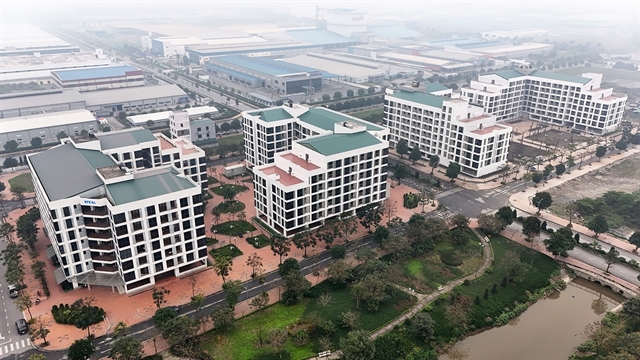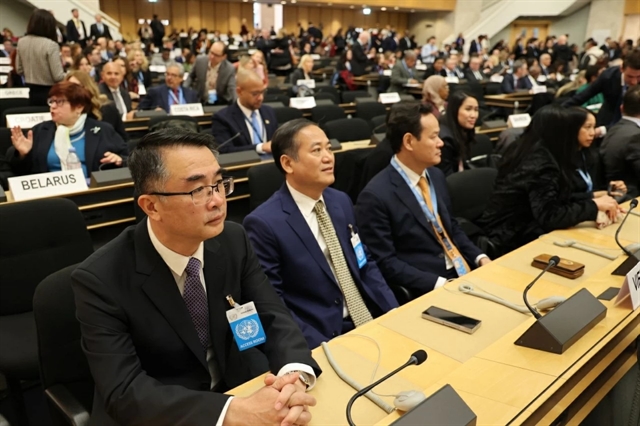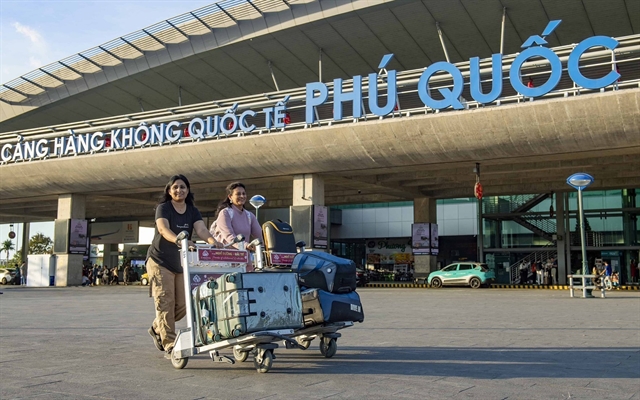 Society
Society

 |
| Social housing apartment blocks in Đồng Văn Industrial Park in Hà Nam Province. — VNA/VNS Photo |
HÀ NỘI — Despite being touted as a crucial solution to address the housing needs of low-income earners, social housing remains out of reach for a segment of the working population due to the rigid income verification process.
An individual who seeks to purchase an apartment in a social housing project must not own another apartment in the area where the project is situated, and their total family income must not exceed VNĐ30 million ($1,156) per month.
While it is usually simple to prove non-ownership of an apartment in the project's locality, income verification is complex, especially for informal workers.
Nguyễn Huyền Trang, a freelance worker in Hà Nội, earns less than VNĐ15 million monthly and currently rents an apartment. Because she plans to start a family soon, she looked into buying a social housing apartment (SHA).
However, she hit a wall when asked to submit verified income documentation.
"I went to the ward office multiple times with my papers, but they refused to certify my income because there was no official basis to verify my freelance work," Trang said. "I was stuck and had no idea how to complete the application."
Trang’s story is not unique. Others, such as Tô Đình Oa, a 70-year-old Hà Nội resident, are also struggling. Oa has been trying to help his son, a gig worker, secure an SHA in the capital.
While his daughter-in-law, a public school teacher, easily qualified due to her formal employment and contributions to social insurance, his son was rejected because of unverifiable freelance earnings.
"Our application was returned several times," Oa said. "I feel helpless. We still haven’t found a solution."
Even salaried employees face complications. In cases where workers switch jobs and experience a short break in their insurance or payroll documentation, even for just one or two months, their applications are often deemed unverifiable.
Gig workers, street vendors, app-based drivers and small traders who lack stable contracts, payroll slips or tax records are routinely caught in a bureaucratic grey area. Ironically, these are often the very people the programme aims to support.
Local authorities also find themselves in a bind. Without clear frameworks or legal tools to assess informal income, ward-level officials face pressure from frustrated citizens and upper levels of government to process applications quickly and accurately.
Vũ Thị Thu Hoài, deputy chairwoman of Thượng Thanh Ward in Hà Nội's Long Biên District, acknowledged the limitations.
"We’ve had cases where applicants worked as security guards without contracts. There’s no way to verify their income. It’s a major obstacle," she said.
At the national level, the Ministry of Construction reported that as of 2021, Việt Nam had 655 social housing projects, comprising nearly 600,000 apartments. Of these, only 103 projects – around 67,000 apartments – have been completed. Another 137 projects are under construction, while 415 await implementation.
Yet the demand far outstrips the supply. With urban housing prices surging and private rentals becoming increasingly unaffordable, social housing projects are often oversubscribed, triggering intense competition and lengthy approval processes.
The experience of Hà Nội resident Lương Quang Ngọc illustrates the ordeal. Ngọc applied to rent an SHA in 2023. Knowing that the odds of directly buying were slim due to oversubscription, he opted for a lease arrangement, with hopes of eventual ownership after five years.
"It was an exhausting process – from registering and compiling documents to passing the approval round," Ngọc said. "Even after securing the rental, I realised the hardest part still lies ahead."
Ngọc noted that any increase in personal assets during the lease period could jeopardise his eligibility to purchase later.
"People joke that to qualify for social housing, you have to stay 'sustainably poor,'" he said.
For developers, the programme is equally fraught. According to Deputy Head of Market Research and Promotion at the Vietnam Association of Real Estate Brokers Phạm Thị Miền, social housing projects remain concentrated in peripheral districts, far from major job hubs. This geographical mismatch adds to the appeal of urban projects, intensifying the rush and competition.
"Standards for qualification are strict, the vetting process is cumbersome, and income verification is often a dead end," Miên said. "Meanwhile, illegal resale and transfer of SHAs continue to undermine access for genuine buyers."
Developers looking to enter the social housing market face their own maze of regulatory and financial barriers. Many cite long approval cycles, red tape and profit ceilings as major deterrents.
"Input costs like land, materials and interest rates are rising. When the sale price is capped and profits are low, most companies simply walk away," a developer said.
Moreover, finding a suitable land lot within urban centres is becoming nearly impossible due to limited availability and soaring prices, pushing projects further into undeveloped areas with poor infrastructure, which deters buyers.
Experts say the problems require systemic fixes. Deputy Director of the Vietnam Real Estate Research Institute Trần Xuân Lượng advocates for a unified "one-stop shop" mechanism at the local level to handle all application-related procedures.
This, he argues, would both streamline the user experience and reduce the burden on officials.
He also called for a publicly disclosed land bank and a curated list of qualified construction suppliers to simplify planning and execution. Additionally, partnerships with banks offering subsidised loans should be formed early in the process.
"We need a full-cycle support chain – from land access, capital and materials to streamlined paperwork. If we don’t untangle these knots, the whole system remains stagnant," Lượng said.
Unless these systemic barriers – particularly the issue of income verification for freelancers and gig workers – are addressed, the social housing strategy risks failing the very people it was designed to support. — VNS




